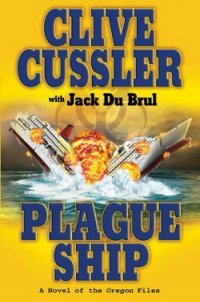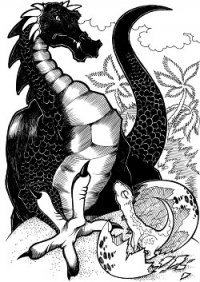Circle of Bones - Kling Christine (полная версия книги txt) 📗
Theo dropped his head forward and his shoulders bounced with his quiet laughter. He looked up at Cole and shook his head. “Oh mon,” he said. “You got it bad.”
With his open hand, Cole thwacked his first mate on the back of the head, but he could still hear the muffled laughter when he left the wheelhouse for the galley.
“How’s it going?” he asked when she looked up at him.
“Okay,” she said. Then, after dropping her gaze back to the chart, she added, “Do you always beat your crew?”
He sighed. She didn’t miss much.
“I’ve been thinking,” he said.
“That’s a good start.”
He thought he could see a hint of a smile on her face when he sat down on the bench across from her. Leaning over the metal box, he withdrew one of the leather journals. “It might help if you read some more of this. You’ll get an idea of how the old man thought.” He fanned the pages with his thumb. Less than half of the book contained his father’s neat writing. “This is the last one. He started it in the fall of 2002. The world was still reeling from September 11th. This was before the Iraq invasion, but the no-bid contracts to rebuild were already a done deal.” He shook his head. “The old man was really on a roll.” Cole sat next to her. He spread the book out on the table and flipped open the pages. “Start here,” he said.
Dear son,
Your country is now asking itself how such a thing could have happened without the intelligence services having foreseen it. The finger-pointing has started. Many are using the phrase “Faulty Intelligence” to lay blame at that fraternity’s door. You may wonder why the brethren don’t object? Because in peacetime, much attention had been focused on the vast secret budgets of the intelligence infrastructure. But this now offers them the opportunity for a counter-attack. They can give the excuse that their warnings could have come sooner had not their budgets been cut and their needs for new technology and manpower been ignored. Also, the warnings they did give were ignored by politicians who chose not to listen. Or so they claim.
In fact, what intelligence was handed over to the decision makers of both your country and mine was filtered through THEIR hands. Their numbers are small and they dwell in the shadows, but their influence is vast. Our leaders can only make decisions based on what they know — and the members of this inner circle decide what flows through that pipeline. One would think that the Americans would begin to wonder why it is that every time some significant military event takes place, the American intelligence community is wrong-footed. Pearl Harbor, the Gulf of Tonkin, 9-11. Faulty intelligence, indeed. But the fault is not a cock-up nor a lapse of any kind. It is intentional and secretive. It is THEIR work. Secrecy is power. It puts this power in the hands not of democracy, but of this monied aristocracy that profits from their advance knowledge of when and where your country will go to war.
I know you will find this difficult to believe. How could THEY have known and allowed thousands to die just to persuade your country to go to war? Take this from an old hand who has seen it all. My experience shows that with intelligence matters, the more bizarre the claim, the more likely it is to be true.
Cole placed his finger on the last sentence on the page. “Every time I read that last line, I think about the way my father died. I think about Alexander Litvinenko, the Russian spy who died of polonium poisoning in London, or the story of the Bulgarian killed by the umbrella that shot poison pellets. I know it sounds mad to say that this old British gentleman was assassinated by the members of some secret cabal simply because he had discovered the whereabouts of a sixty-year-old submarine, but there it is: the more bizarre the claim, the more likely it is to be true.”
“Cole, listen,” she said. “I’m willing to spend this day with you guys looking for whatever this is that your father wants you to find. I’ll be honest, the connection to Skull and Bones has piqued my interest. But I don’t think the them you’re talking about is Bones. I just can’t swallow this whole conspiracy theory that you and your father have inhaled without chewing. I’m a slow eater, Cole. Anyway, why don’t you go get some rest and leave me to read this.” She flipped to the first page of the journal and started to read. After a few seconds, when he had not moved, she turned to him. “Go on. If I find something, I’ll call you.”
Cole closed the door to his cabin, lay down on his bunk fully clothed, and laced his fingers behind his head. He stared up at the overhead. Sleep, he thought. Yeah, right.
CHAPTER FORTY-TWO
Portsmouth, Dominica
March 27, 2008
8:15 a.m.
Riley awoke to the loud rattle of the anchor chain feeding out through the steel hawse pipe. She’d fallen asleep face down on the table, and when she sat up, she had to peel the damp paper chart off her cheek. James Thatcher’s journal lay open atop the chart, her right wrist still resting in the center of the pages. She checked her watch — it was after eight o’clock. Stretching her arms high over her head, she opened her mouth in a big, ear-popping yawn. Sunlight streamed in through the exterior door that led out to the side deck, and she heard unintelligible voices outside. It must be the guys up on the foredeck, she thought.
She slid off the bench, stepped through the forward door, and admired the view through the eight windows that graced the rounded front of the Shadow Chaser’s classic pilothouse. She saw the two of them standing out in the brilliant glare on the foredeck — Cole in khaki shorts, white T-shirt, hiking boots, and a faded blue baseball cap and Theo in long plaid shorts bunched at his waist with a length of rope and sporting dark mirrored sunglasses. They were an odd pair, she thought. Theo was tall enough to be a professional basketball player, but the bit of leg showing between his shorts and his flip-flops looked bird thin. Cole’s legs, on the other hand, were thicker, his calves knotted with muscle.
She chuckled to herself and wondered what her friend Hazel would say if she could see her here gawking at those shoulders and the waistband where Cole’s T-shirt was tucked into his shorts. She would undoubtedly ask why Riley had sent him packing last night, and then add that if she was going to turn that down, she really should go buy a cat.
“It’s not that simple,” she said aloud, and she wasn’t at all sure if she was speaking to Hazel, her brother, or herself. She remembered the light in Cole’s eyes a few hours ago as he spoke about his father’s journals and this crazy theory that somebody, somewhere had known what Al-Queda was up to and had suppressed the information. And somehow that was tied to some World War II wreck? One minute, this whole thing seemed possible, even logical — and the next minute, she felt like she had fallen down the rabbit hole.
Beyond the two men rose a jungle-covered headland with the ruins of another stone fort. Beneath that, the bay swept round to the buildings of the town nestled at the base of the green hills.
So, they’d arrived in Prince Rupert Bay and that was the town of Portsmouth on shore. Her memories of this place harkened back to a much simpler time in her life. Back when her father was posted in Barbados, her dad had taken them on a business trip. They’d flown in a seaplane to Antigua so he could visit the consular offices there. He’d done his business in the morning in St. John’s, and by afternoon they were aboard a borrowed sloop headed down island.
That had been a glorious week. In those days, she and her brother still reveled at the chance to spend time alone with their father. Once they managed to separate him from his briefcase, they had gone for morning swims in the crystalline water and laughed while cooking fresh-caught kingfish and fried plantains. They’d climbed to spectacular waterfalls and stood still in the cool mountain air waiting with binoculars for a glimpse of the native wild parrots. Here off Portsmouth, their little sailboat had been accosted by dozens of boat boys offering to row them up the Indian River. Michael had selected the littlest boy, Galen, and it had taken him more than an hour to row them up the dark jungle tunnel that was the river.




